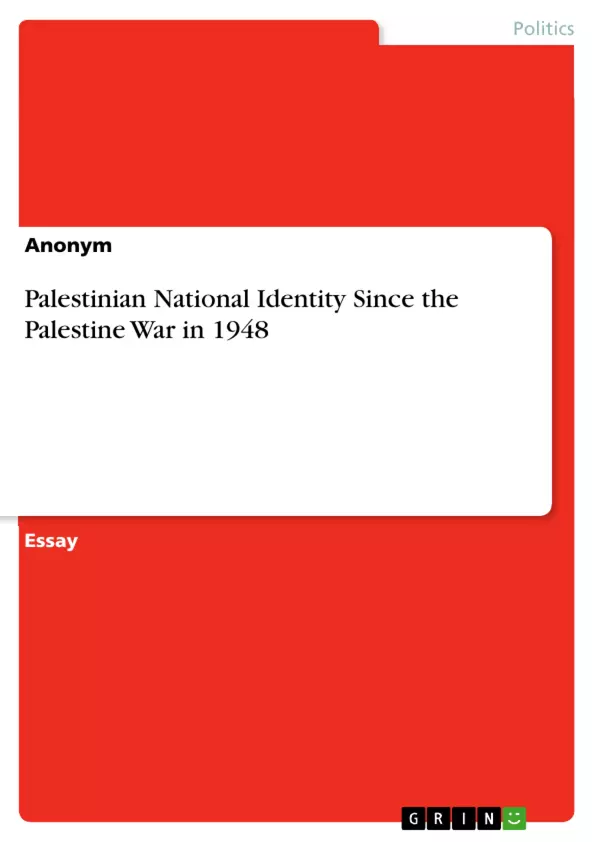In this essay, the author explores how the results of the 1948 Palestine War (Arab-Israeli War) are reflected in Palestinian history and discusses how the narratives have influenced the reconstruction of the Palestinian national identity since 1948.
Even though for many the Palestinians have disappeared from the political map as an independent actor and even as a people during this period, it is quite obvious, which significance the events in 1948 had on the formation of a Palestinian identity (Khalidi, 2009). In the following, I will explain how the results of this war are reflected in Palestinian history and discuss how the narratives have influenced the reconstruction of the Palestinian national identity since 1948. However, before doing so, I would like to point out some important aspects, that should be considered in a discourse on national identities.
Inhaltsverzeichnis (Table of Contents)
- The Rebuilding of the Palestinian National Identity Since 1948
- The Impact of the 1948 War on Palestinian Identity
- The Nakba and its Consequences
- The Discourse of Victimhood
- The Rise of Palestinian Nationalist Groups and Movements
- The Influence of Pan-Arabism
- Palestinian Identity and the Struggle Against Zionism
Zielsetzung und Themenschwerpunkte (Objectives and Key Themes)
This essay aims to explore the rebuilding of the Palestinian national identity since 1948, focusing on the impact of the 1948 war and the narratives that have shaped this process. The essay analyzes how the consequences of the war, particularly the displacement and exile of Palestinians, contributed to the formation of a collective identity.
- The impact of the 1948 war on Palestinian identity
- The development of a discourse of victimhood
- The emergence of Palestinian nationalist groups and movements
- The influence of Pan-Arabism on Palestinian identity
- The role of the struggle against Zionism in shaping Palestinian identity
Zusammenfassung der Kapitel (Chapter Summaries)
The essay begins by discussing the lasting impact of the 1948 war on Palestinian identity, highlighting the displacement and exile of Palestinians and the resulting sense of loss of sovereignty. It examines how the concept of victimhood, which emerged as a coping mechanism, became a central axis in the construction of Palestinian identity after 1948. The essay then explores the rise of Palestinian nationalist groups and movements in the 1950s, driven in part by this sense of victimhood. The essay further analyzes the influence of Pan-Arabism on Palestinian identity, arguing that it provided a sense of collective identity for Palestinians dispersed across different geographical locations. The essay concludes by examining the significance of the struggle against Zionism in shaping Palestinian identity, noting the common feeling of threat and shared perception of the "Other" that emerged from this struggle.
Schlüsselwörter (Keywords)
This essay focuses on the key terms and concepts of Palestinian national identity, the 1948 war, the Nakba, victimhood, Palestinian nationalist movements, Pan-Arabism, and the struggle against Zionism. It explores how these concepts have contributed to the formation and evolution of a Palestinian identity since 1948.
- Quote paper
- Anonym (Author), 2021, Palestinian National Identity Since the Palestine War in 1948, Munich, GRIN Verlag, https://www.hausarbeiten.de/document/1362685


